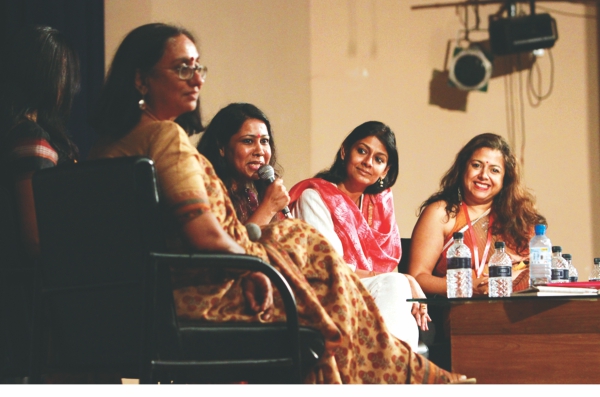| Rendezvous

An Inspiration for the Young: Nandita Das
Elita Karim
Photos: Kazi Tahsin Agaz Apurbo
"Can we sit somewhere a little quiet, maybe?" asks Nandita Das, as we whirl past people at the Pan Pacific Sonargaon Hotel lobby -- corporates and business people trying to find their meeting groups, random people watching the match and a mix of the young and old trying out health drinks and sandwiches after a gym workout. We find a spot by the pool and prepare ourselves to discuss Nandita's life -- childhood, her school, her work and of course her visit to Bangladesh.
An award winning film and theatre actor, Nandita is best known for her roles in “Fire” (1996), “Earth” (1998), “Bawandar” (2000) and “Aamaar Bhuvan” (2002). She has been honoured with the Chevalier of the Ordre des Arts et des Lettres by the Government of France.
Nandita Das, born on November 7, 1969, has always been an inspiration for all, especially the younger ones living in the subcontinent. Most youngsters can relate to her films, no matter where they live and what issue the film portrays. Sometimes, many of her films end up being lessons for these younger people who dream of walking on beds of roses. Starting from homosexuality, political crime, women's rights to education for all children, the characters that she played in films influence quite a number of young thinkers, even today, to change the ways around for the best. Other than doing films and writing columns, Das also gives talks around the world about the impact of her films and the need for powerful social movements in India. On April 12, 2007, she spoke at Massachusetts Institute of Technology, popularly known as MIT, one of the leading universities in the world, after a screening of 'Fire'. Appointed the chairperson of the Children's Film Society of India, in 2009, Das also speaks to campaign for child survival, against AIDS, and violence against women.
"As a child, I was very unaware of the real world around me," says Das. "My parents were never the pressing kind and would always encourage us to do things like plant trees every other day, read a good book, listen to music, and create something and so on. I remember during my board exams, I was freaking out! My parents were never really strict, and when my father found me to be so nervous about my exams, he tried to help me in his own way. “Go water the garden, you will feel better”, I remember him saying. My reaction however was absolutely unexpected! I cried to my dad -- “Why can't you be like the other fathers who push their children to study during the boards? How can you ask me to water the garden during a crisis?" Nandita could not help laughing while relating this story. Were her parents ambitious about her, the way parents are today about their children? "Not at all!" she remarks. "My parents were never bothered about what I was doing, how many marks I was getting in school tests and even during my undergrad, they never encouraged me to get in to the competitive market. Rather, I was always encouraged to look at the real picture, to work with a purpose in my mind, no matter what I did."

Nandita Das at the Hay Festival, Dhaka, 2012.
Nandita Das received her bachelor's degree in Geography from Miranda House (University of Delhi). "I took a year off after my undergrads to explore a bit and learn about life from life itself," she says. "Later on I got my Masters in Social Work from the Delhi School of Social Work."
Das talks about how she simply could not follow conventions the way people her age were during her time. "See, if I had told my parents that I was going to be an executive at a well-known bank, they would have thought I was crazy!" With a painter father Jatin Das and writer mother Varsha Das was exposed to elements of life that other younger people are usually not. "Not really!" smiles Das. "I think only after I started to work with people from all walks of life and research these characters in my film before playing them, I started to realise the reality of life itself." There is no way out, but to mix with people from all walks of life, if youngsters would like to solve issues and make the country a better place, she reiterates.
"I am not a Bengali, I hope you don't mind my broken Bengali!" says Nandita Das in perfect Bangla. "I grew up in a household speaking many languages. My father is from Orissa and my mother from Gujarat."
A couple of weeks ago, Nandita Das had visited Dhaka to perform along with her husband, Subodh Maskara, in a play “Between the Lines” at the Radisson Blu Water Garden Hotel (organised by Excalibur Entertainment and Jatrik). She also attended the 'Hay Festival 2012' and was in fact one of the panellists at a session.
Having worked with a number of well-known directors of her time -- Mrinal Sen, Adoor Gopalakrishnan, Shyam Benegal, Deepa Mehta, Mani Ratnam and others, she has not only become the face for parallel films of sorts in India, but has also become a household name amongst the masses in the subcontinent. Her directorial debut feature film, Firaq, premiered at the Toronto International Film Festival in 2008, and has travelled to over 50 festivals, winning much appreciation from critics and audiences and has won over 10 international awards and 10 within the country.
Nandita Das is big on cultural exchange and would like to see young people exchange ideas between countries through their creativity -- music, artwork, films and much more. Only then, can we have a whole new generation who are well aware of what goes on around them, thus becoming a global citizen.
|
|
|
